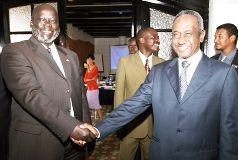Sudan says SPLA delays prisoner exchange
KHARTOUM, March 23 (Reuters) – Sudan accused former southern rebels on Wednesday of holding up the release of hundreds of prisoners taken captive during the country’s long civil war.

|
|
John Garang, and Ali Osman Taha shake hands, Thursday, Oct.7, 04, during the opening of the fifth session of the high level consultative meeting on the Peace Talks in Nairobi (AP).. |
The Sudan People’s Liberation Army (SPLA) signed a peace deal with the government in January to end more than 21 years of fighting in the south.
But Ahmed Haroun, state minister for the interior, said the SPLA had still not signed a memorandum of understanding allowing the International Committee for the Red Cross (ICRC) to bring detainees back to Khartoum.
He said the government had signed the prisoner exchange document. But he said he did not think the government was still holding any prisoners.
Asked what was delaying the release of those held by the SPLA, Haroun said: “We are awaiting the signature of the SPLA on this agreement.”
No one from the SPLA leadership was immediately available to comment.
Sudan had previously said prisoner releases would start within a week of the peace deal signing on January 9.
The ICRC, which has been visiting prisoners held by the SPLA since 2003, said it had registered around 700. But it said it could not return them until the SPLA signed the memorandum.
ICRC information officer Lorena Brander said false press reports that releases had begun had resulted in hundreds of families sleeping at the airport waiting for ICRC planes and lining up outside ICRC offices for news of relatives.
“One poor man travelled two days on a donkey from Darfur to come to ICRC to ask about his relatives,” she said.
Brander said the government had told them it did not have any prisoners to exchange.
Asked what had happened to people captured by government forces, Haroun said: “With most of them the proper procedures were followed and some others have already been released.”
He did not explain what was meant by “proper procedures”.
The top SPLA official in Khartoum, Deng Goc Ayuil, has said he believes the government may have killed its prisoners during the war.
“International organisations and media need to ask them where are these prisoners,” he said. Asked about the delays, he said: “The Red Cross and the leadership are dealing with this now.”
The southern civil war broadly pitted the Islamist government based in Khartoum against the mainly Christian and animist rebels in the south and was complicated by issues of oil, ethnicity and ideology.
The war claimed 2 million lives, mainly from hunger and disease and forced more than 4 million from their homes.
